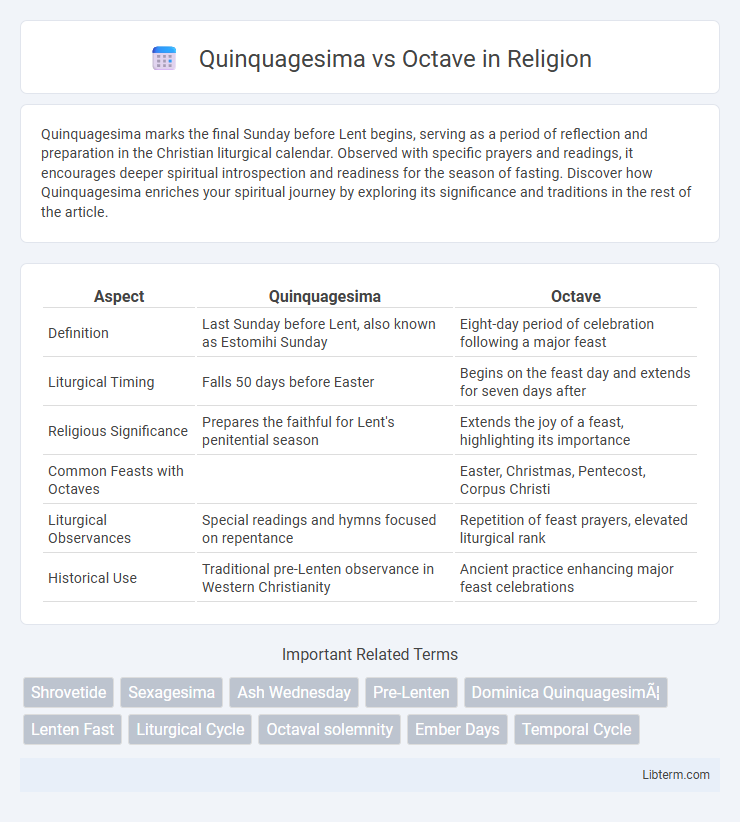Quinquagesima marks the final Sunday before Lent begins, serving as a period of reflection and preparation in the Christian liturgical calendar. Observed with specific prayers and readings, it encourages deeper spiritual introspection and readiness for the season of fasting. Discover how Quinquagesima enriches your spiritual journey by exploring its significance and traditions in the rest of the article.
Table of Comparison
| Aspect | Quinquagesima | Octave |
|---|---|---|
| Definition | Last Sunday before Lent, also known as Estomihi Sunday | Eight-day period of celebration following a major feast |
| Liturgical Timing | Falls 50 days before Easter | Begins on the feast day and extends for seven days after |
| Religious Significance | Prepares the faithful for Lent's penitential season | Extends the joy of a feast, highlighting its importance |
| Common Feasts with Octaves | Easter, Christmas, Pentecost, Corpus Christi | |
| Liturgical Observances | Special readings and hymns focused on repentance | Repetition of feast prayers, elevated liturgical rank |
| Historical Use | Traditional pre-Lenten observance in Western Christianity | Ancient practice enhancing major feast celebrations |
Introduction to Quinquagesima and Octave
Quinquagesima, derived from Latin meaning "fiftieth," marks the Sunday before Ash Wednesday, serving as the final Sunday of the pre-Lenten season in the Christian liturgical calendar. Octave refers to the eight-day extension of a significant feast, such as Easter or Christmas, emphasizing the prolonged celebration within Christian worship. Both Quinquagesima and Octave structure the rhythm of liturgical observances, guiding spiritual preparation and festivity periods in ecclesiastical tradition.
Historical Origins of Quinquagesima
Quinquagesima, known as the Sunday before Ash Wednesday, originated from early Christian liturgical practices as a preparatory period before Lent, marking the final Sunday of the pre-Lenten season. Its name derives from the Latin word "quinquagesimus," meaning fiftieth, referencing the approximate fifty days before Easter. In contrast, the Octave refers to an eight-day period celebrating major feasts, such as Easter, emphasizing extended solemnity rather than pre-Lenten preparation.
The Meaning and Significance of Octave
Octave in liturgical tradition refers to an eight-day extension of a feast, highlighting its theological and spiritual importance beyond a single day of celebration. It symbolizes the fullness and completeness of the event, often emphasizing the resurrection of Christ or other key Christian mysteries. Compared to Quinquagesima, which marks the preparation period before Lent, Octave centers on the prolonged joy and reflection following a major feast.
Liturgical Importance: Quinquagesima in the Church Calendar
Quinquagesima marks the final Sunday before Lent, serving as a liturgical bridge between Epiphany and the penitential season, emphasizing preparation through joyful reflection. It holds significant importance as a prelude to Ash Wednesday, encouraging the faithful to contemplate repentance and spiritual renewal. The Octave, in contrast, celebrates the eight-day period following major feasts, primarily Easter, highlighting the continuation of festal joy and resurrection themes within the Church calendar.
Octave Observances: Traditions and Practices
Octave observances in Christian liturgy emphasize extending the celebration of a significant feast day for eight consecutive days, deeply rooted in Roman Catholic and Orthodox traditions. These practices often involve special prayers, processions, and the repeated chanting of specific hymns to honor the solemnity of the feast. The Octave serves as a spiritual amplification that reinforces the theological importance of events such as Easter and Christmas through sustained communal worship and ritual acts.
Key Differences Between Quinquagesima and Octave
Quinquagesima refers to the Sunday before Ash Wednesday, marking the final Sunday of pre-Lenten season in the Christian liturgical calendar, while Octave denotes an eight-day extension of a feast, celebrating significant events such as Easter or Christmas. The key difference lies in their liturgical function: Quinquagesima serves as a preparatory day initiating the Lenten period, emphasizing penitence and reflection, whereas Octave celebrations involve an extended period of festivity and solemn observance of the feast's importance. Liturgical texts, colors, and rituals vary accordingly, with Quinquagesima using penitential themes and Octave focusing on joyful commemoration.
Theological Themes in Quinquagesima and Octave
Quinquagesima emphasizes the themes of repentance and preparation for Lent, highlighting human sinfulness and the need for divine mercy, whereas the Octave centers on the Resurrection's triumph, embodying themes of victory over death and eternal life. Theologically, Quinquagesima poignantly calls believers to self-examination and spiritual renewal before the penitential season, while the Octave celebrates the fulfillment of salvation history through Christ's resurrection. These distinct thematic focuses shape the liturgical tone and devotional practices unique to each observance.
Cultural and Regional Variations in Celebration
Quinquagesima, observed mainly in Western Christian traditions such as Lutheran and Anglican churches, marks the final Sunday before Lent and features customs like feasting and carnival-style festivities, especially evident in regions like Germany and Scandinavia. Octave celebrations, prominent in Roman Catholic communities, particularly in Italy, Spain, and Latin America, extend liturgical feasts over eight days, emphasizing processions, special masses, and devotional activities honoring saints or significant religious events. Cultural adaptations result in diverse observances, where Quinquagesima's emphasis on pre-Lenten merriment contrasts with the Octave's focus on prolonged sacred reverence, reflecting regional liturgical calendars and local religious customs.
Quinquagesima and Octave: Contemporary Relevance
Quinquagesima Sunday, observed three Sundays before Easter, remains significant in contemporary liturgical calendars for marking the final Sunday before Lent, emphasizing preparation and reflection. The octave, a liturgical period spanning eight days following major feasts, continues to underscore the enduring importance of extended celebration and solemnity within religious traditions. Both Quinquagesima and the octave sustain their relevance by structuring the rhythm of worship and enhancing spiritual focus in modern Christian practices.
Conclusion: Reflecting on the Spiritual Significance
Quinquagesima and Octave each hold profound spiritual significance within the liturgical calendar, marking distinct phases of preparation and celebration. Quinquagesima emphasizes penance and anticipation as the final Sunday before Lent, fostering introspection and readiness for repentance. In contrast, Octave symbolizes the culmination of a sacred feast, highlighting joy and the enduring presence of grace in the Christian journey.
Quinquagesima Infographic

 libterm.com
libterm.com